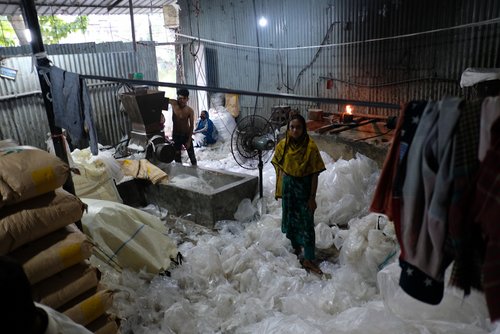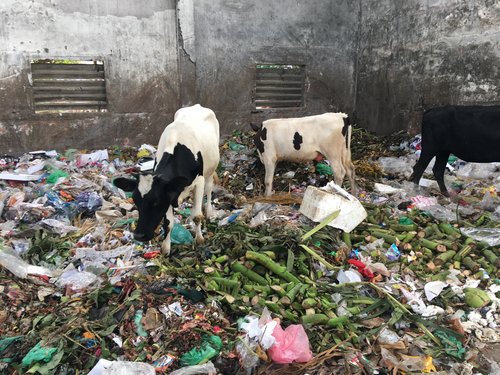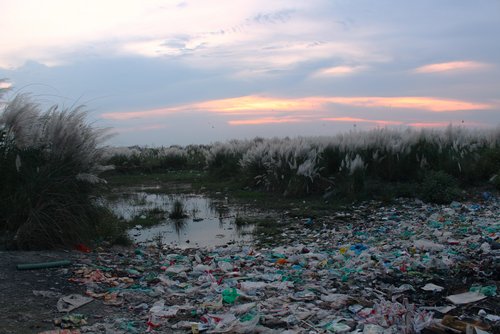Research diary »SCIP Plastics«: Jute instead of plastic?
Single-use plastic bags are officially banned in Bangladesh. Nevertheless, they are part of the cityscape. Researchers in the »SCIP Plastics« project from Bangladesh and Germany are therefore looking for alternatives. Susanne Kühlewindt reports on this in the third episode of the research diary.
Single-use plastic bags in Bangladesh – in use despite ban
Jan 2023:
Looking at pictures which capture the waste management situation in the city of Khulna, it is quite obvious that legal requirements and lived practice do not match. Why else do you see so many single-use plastic bags, even though their use has been banned in Bangladesh since 2002? Within our working group in the project, we want to find out whether there are alternatives to plastic products whose use would be more ecological and economic feasible. The focus of the investigation is on single-use plastic products.
In recent months, one of the things we have been researching is which single-use plastic products are commonly used at the household level in Bangladesh. A study by World Bank in Dhaka showed that up to 30 percent of plastic waste from households are single-use plastic bags. Reducing or even eliminating this percentage is desirable when regionally available, ecological alternatives are available. Since jute cultivation has a long tradition in Bangladesh, the investigation of jute as an alternative product is obvious. We are currently working on a life cycle assessment that first compares the raw material production of plastic granulate with the agricultural cultivation of jute. In further steps, different plastic and jute products will be compared in a regional context. I am already looking forward to the results. Until then, it's research and calculation every day. The bi-weekly online discussions with the colleagues from the Bangladesh working group are always a great for knowledge exchange and help the understand the local conditions.
M. Sc. Susanne Kühlewindt
Chair of Biotechnology in Resources Management
Bauhaus-Institute for Infrastructure Solutions (b.is)
Background:
The research team of Prof. Dr.-Ing. Eckhard Kraft addresses a global problem: the plastic waste in our oceans. Thousands of years pass before it decomposes. Until then, the plastic parts decay into smaller and smaller particles. These are often mistaken for food by marine animals, which can lead to an agonizing death. The engineers at the Bauhaus Universität Weimar, together with a team from Bangladesh and the Institute for Social-Ecological Research, are researching how to ensure that the garbage does not end up in the sea. The research project is called »Sustainable Capacity Building to Reduce Irreversible Pollution by Plastics» - in short: SCIP plastics. Together they are looking for solutions for waste management and are developing a knowledge transfer center on the campus of the »Khulna University of Engineering & Technology«. Their goal – in the future waste should be better collected, sorted and recycled. The researchers have time until November 2024 to find solutions - the research diary accompanies their research.
![[Translate to English:] (Stefanie Waske) [Translate to English:] (Stefanie Waske)](/fileadmin/_processed_/f/1/csm_Tagebuch_Scip_Plastic_Folge_3_226764c5a0.jpg)
Project description
Websites about SCIP Plastics:
Bauhaus-Universität Weimar:
https://www.uni-weimar.de/en/civil-engineering/chairs/biotechnology-in-resources-management/research/current-projects/scip-plastics/
Khulna University of Engineering & Technology: https://kuet.ac.bd/scip/index.php
Contact:
Prof. Dr. Eckhard Kraft, Professor of Biotechnology in Resources Management, Faculty of Civil Engineering, via e-mail (waste[at]bauing.uni-weimar.de) or phone (+49 (0) 3643 / 58 4621).



